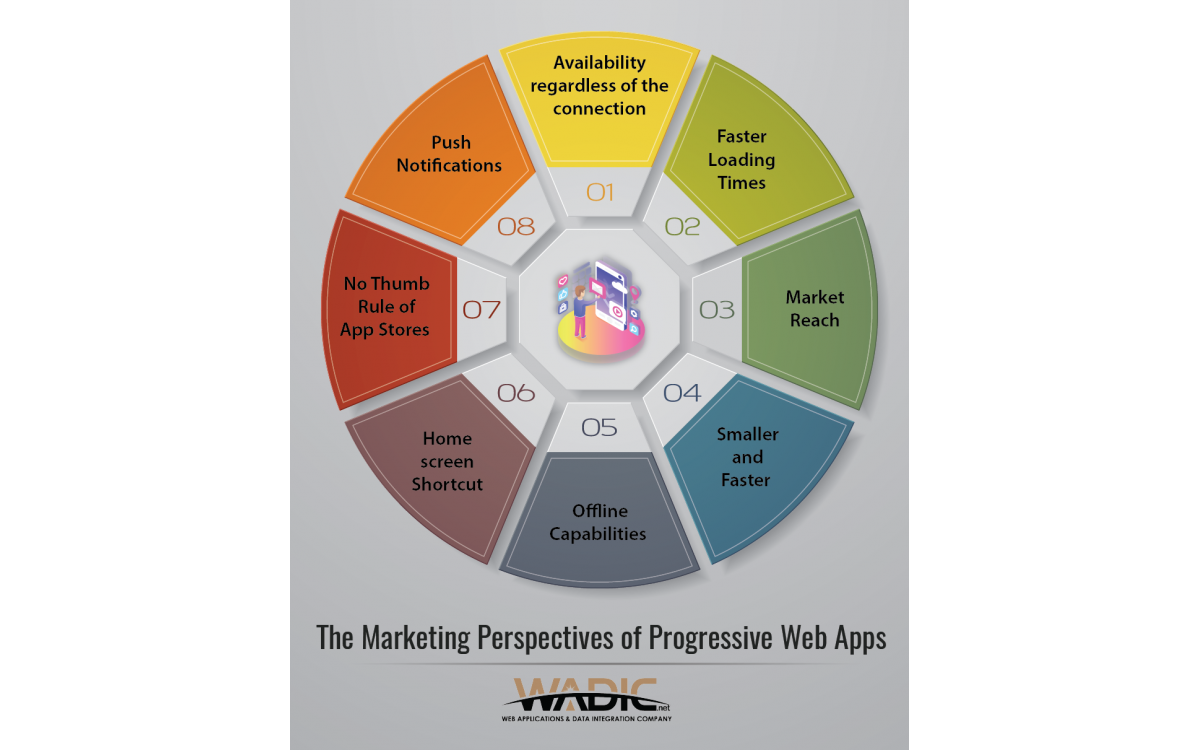Progressive Web Apps leverage the latest web capabilities to deliver an experience that combines the peculiar features of Mobile Apps with the benefits of the web. They combine the benefits of a native app with low friction of web. The connectivity of web apps with mobile apps enables users with push notifications, speed up the sites and improves the functions of the apps. They are responsive, and don’t need to be downloaded from an app store. They are safe, don’t need much space and they’re free to install on your phone, tablet or desktop. Progressive web apps help strengthen a company’s market growth, especially those on a limited budget.
PWAs are lightweight, feature-heavy apps are rapidly changing the landscape of Web Development and providing companies with a better opportunity to improve their competitive edge. These modern web apps are becoming even more mainstream. Many tech giants, from Amazon to Facebook, are already on board.
Availability regardless of the connection
Progressive web apps are independent as they don’t depend upon user’s connection like traditional websites. It provides a fully featured user experience for users who are offline, online or have a broken or unreliable connection.
Progressive web apps provide the level of reliability and gain the user’s trust level like native apps. As a customer can open Whats App anytime and can freely write a message without getting worried about the current connection of phone. Thanks to PWAs, users can enjoy similar benefits of a native app in their Web Applications.
Fast Load Times
Regardless of the bandwidth of network connection, either 2 G or 3G or no connection at all, sites still can load in milliseconds, much faster than any web application experienced before. Even it’s faster than native apps.
Market Reach
No one can deny the market value of progressive web apps as it has connection free access. People from countries with poor internet connection can take tons of business to improve their business efficiency. These apps provide free access to far better and reliable than native apps. The web is also sometimes a better option for startups than mobile apps. They don’t have to rely on iOS or Android apps’ conditioned and limited connection. Progressive Web apps allow companies to reach everywhere, regardless if they have iOS or Android devices.
They are Smaller and Faster
Native apps take up a ton of space. A large amount of people, even though they would admire to use these apps, but not having enough space on their phone, consequently they cannot install them. That’s not a trouble with PWAs, it only takes what users really need, making them faster to download.
Offline Capabilities
The reason for employing PWAs by the large number of users is of its offline capabilities. These apps work efficiently even if the server is dead. The user is still connected with their data. Users are not losing their content. Offline availability enhances the user experience as they still can work on their business without worrying about a broken Internet connection.
Home screen Shortcut
Home screen shortcut ensures 24 hours availability of your data on home screen shortcuts. They can be launched in full-screen mode, without the phone, browser, and UI around them. They also can have separate locks to these screen shorts
No Thumb Rule of App Stores
Not all apps are actually accepted by app stores, which have a lot of rules and restrictions when it comes to publishing. There are no restrictions on the progressive web apps. The user is the one who is in charge of the whole web process. They can also update the features immediately.
If the user wants to update your mobile app, you need to go through the app store’s review process. It could take days and it may to take weeks as well. Still, it needs some time, and there is a possibility it could be banned or rejected. You can make changes on the progressive web apps at any time. It’s much easier takes less time.
Push Notifications
Another marketing benefits of native apps are Push Notifications. Push notifications allow you to communicate with your apps easily and provide the trust able user experience. Progressive web apps can also send the notification to their users. These notifications are the great functionalities to interact with your clients. PWAs possess a complete native feel and are indistinguishable from native app notifications,
Advantages
• Low on Data: In emerging markets like third world countries, who still have a low bandwidth, data comes at a premium. An app which takes close to 10 MBs as a native app, can be reduced to about 500KB when made in PWA.
• No Updates Required: PWAs gets updated like other web-pages. You get the latest version when you choose it to. No need to update them every now and then.
• PWAs don’t need to install them to start using. They are simple web-pages. Users choose to install when they like it.
• Flexible Sharing: Unlike any app, you can share a PWA with its URL
Disadvantages
• With more and more Social Media Companies making their own in-app browser, it is getting difficult to promote PWAs’ hand on experience on social media.
• Not available on Play Store: Traffic from the mobile web can be redirected to the Play Store to download the native app but it doesn’t work the other way round. The significant traffic is lost if you use play store for primary research.
• Plugins like Facebook and Google logins can’t fetch data from Facebook and Google Apps. You need to separately login on the web too.
• PWAs can’t use some of the latest hardware advancements (like fingerprint scanner), they are browsers after all.
• Key re-engagement features like add to home screen, notifications etc. Full support for PWA is not available in default browsers of some of the manufacturer’s.

